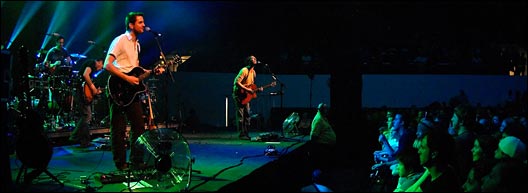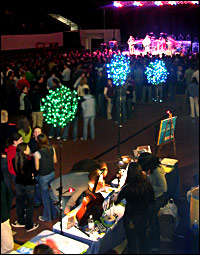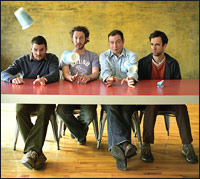
Singing a new song: Guster rocks out for eco-awareness.
Photo: Ian B. Johnson.
After welcoming some 1,500 fans to a concert at the University of Puget Sound in Tacoma, Wash., last week, Ryan Miller — the curly haired front man of pop/rock band Guster — asked the audience if they had noticed that he changed the lyrics in the first song from “Ramona” to “Tacoma.” After a short pause, he added, “That’s the kind of fucking intellectual hijinks we’re gonna go with tonight.” And Miller wasn’t entirely joking. The Tacoma show was the first in the band’s Campus Consciousness Tour, a multi-city effort to bring student audiences more than Guster’s folksy, hand-drummed rock.
The tour was organized by Reverb, a nonprofit cofounded in 2004 by Guster guitarist/singer Adam Gardner and his wife Lauren Sullivan to help bands reach out to fans on environmental issues. Inspired by the eco-village accompanying Bonnie Raitt’s tours, Reverb has worked with Barenaked Ladies, Alanis Morissette, Dave Matthews Band, Jack Johnson, Avril Lavigne, and others to green their tours and provide interactive opportunities for concertgoers. In the back of the Fieldhouse in Tacoma, just far enough from the booming speakers to make conversation possible, sat a handful of tables warmed by blue and green holiday lights and filled with information about biodiesel, chemical-free cosmetics, organic snacks, and even Grist‘s Peruvian eco-trip sweepstakes.

Fans discuss eco-issues during the Tacoma show.
Photo: Sarah van Schagen.
Why make music a platform for politics? “Musicians have this ability to talk to people — thousands and thousands of people at a time — and they can say exactly what they want,” Sullivan says. “Politicians can’t do it — they’re beholden to 7,000 lobbyists and companies. Actors can’t do it — they’re scripted. I can’t think of any other place where somebody can talk to 25,000 people at once and say something positive.” As an example, she mentions a concert where Barenaked Ladies’ Steven Page wore a Vote Solar T-shirt and told the audience to visit a table outside. “All of a sudden, people were five deep, signing this petition [for a solar bill],” she marvels.
For their part, Gardner and Sullivan are “still connecting the dots” when it comes to living green. Sure, they’re “hard-core recyclers,” use compact fluorescents where they can, and buy renewable power for their home — but they insist they’re no environmental models. Which is why they’ve partnered with organizations that have a bit more experience: NativeEnergy is helping make the tour carbon-neutral; the National Biodiesel Board provides fill-ups for the tour’s two buses; Clif and Luna Bar hand out eco-snack samples at the events; Rock for a Remedy takes food-drive donations; and City Year, a national service organization, is setting up service-learning projects at many of the campuses on the tour. Members of Student PIRGs and the Campus Climate Challenge will also be involved, managing related day-of-show events.
At the University of Puget Sound, that event was “Environmental Jeopardy,” held in the early afternoon. Sullivan, Gardner, and Guster newcomer Joe “Alex Trebek” Pisapia teamed up with students to field questions on topics ranging from the CFCs in Donald Trump’s hairspray to the health of the Yangtze River. (Singer Miller and drummer Brian Rosenworcel were elsewhere doing a radio interview.) Afterward, Grist chatted with the three about their commitment to eco-issues, the band’s upcoming album, and what they hope fans will really hear.
Grist: Where does your interest in environmentalism come from?
Pisapia: I think anybody who’s got half an eye open can see what’s going on. I know a lot of us are just passionate. We travel all the time, and on days off, you want to get out and see something natural and enjoy these spaces.

Guster (from left: Gardner, Miller, Pisapia, Rosenworcel).
Photo: Guster.
Grist: What issues are most important to you?
Pisapia: Global warming, of course, is one of the biggest. That, to me, is the umbrella for almost all of it, right now. Just because that’s our most pressing issue.
Gardner: I think for me: air quality. Toxics are a big issue. And talk about immediacy. Half the stuff you purchase, from paints to rugs to cars, is horrible for you. That’s something my eyes were just opened to recently, and the more you open your eyes to it, the more you realize: we’re in trouble.
Grist: And a lot of that is your very personal environment.
Gardner: Exactly — it’s not this big thing that will happen at some point down the line. This is something you’re breathing in right now. This whole tour for me is just letting people know what they can do in their own lives. Especially college kids. It’s a consumer nation, and helping people make better consumer choices that affect the environment positively, or at least not as negatively, is a huge goal of mine.
Grist: As you tour in different cities, do you see a difference in attitudes toward the issues you’re talking about?
Gardner: If you’re on a campus or in a liberal town, and you’re talking to the right people, sure, there are concerns. But I don’t feel like it’s out front on every discussion. Unless we purposely bring it out there and talk about it, it’s not happening. I actually just had this conversation with Steven Page; he thinks it’s going to get worse before it gets better, like something really tangible is going to have to happen, environmentally speaking, for people to actually wake up to it. And I agree.
At the same time, I do feel like one of the litmus tests is the way corporate America is reacting to consumers, which seems to be in the worst case greenwashing and in the best case, companies like Clif Bar that actually mean it and are doing the right thing. There’s at least some recognition from corporate America that they have to clean up their act, literally. But on the personal, social level there’s a lot of room to grow.
Pisapia: Especially as we hit, you know, [air quotes] “middle America,” it’s clear that it’s not on top of people’s priority list at all.
Grist: Can you talk a bit about using music as a vehicle for social change?
Gardner: Yeah, it’s funny — it’s not something we thought we’d do, because our music itself isn’t necessarily political. Although the new record leans a little more that way than ever before — not necessarily a commentary as much as “hey, this is a little iffy …” [Laughs.] The state of affairs is a little sketchy right now, I’d say is the overall theme of the record.
But I think this tour has more to do with our relationship with our fans and how we can help them make better decisions. Not to say that we make all the right decisions, because we don’t. We’re learning a lot ourselves on this tour. Our fans tend to be college kids, and colleges are their own little ecosystems, so if they can influence their administrators to practice more environmentally friendly ways of powering the school — use renewable energy, convert your campus vehicles to biodiesel — that’s where it’s at for us. If it’s coming from their favorite band as opposed to their mom or a teacher or a politician — bands are in that unique position where their fan base wants to hear what they have to say. The trick is to not be preachy. What’s nice about this tour is that we have the groups that are on campus and beyond speak for themselves.
Grist: Your new album is called Ganging up on the Sun — is that global warming-related?
Pisapia: The line it comes from is “the moon and stars are ganging up on the sun” — and it’s sort of like a darkening, like a myth of evil and good, in a way.
Gardner: That comes from a song called “Manifest Destiny,” so that might give you some insight as to what the song is about — it’s definitely a statement on where we are as a country, I guess. I don’t want to speak for Ryan, who wrote the lyrics, but that’s what it means to me.
Grist: Are you doing anything environmental as far as the new album is concerned?
Gardner: I was looking into that. I’m really interested in how they’re using corn now for plastics. The problem is we don’t have much control over that because we’re signed to Warner Bros., and they’re the ones putting out the record. I was impressed to hear that all records that they anticipate selling over 200,000 copies — which is what Guster is — will be printed with soy inks. So that’s something. I know there are programs where you can plant trees, for every CD you sell you can figure out how many trees to plant to offset it, so we’re going to look into that.
Grist: And you guys encourage downloads? That’s also an environmental way to do it.
Gardner: Yeah, it’s a great way to do it. And it’s a great way for music to spread anyway. I mean ultimately, I don’t listen to CDs anymore. I’m all hard drive, all the time.
Grist: Who has inspired you, not just musically, but in terms of social change?
Gardner: I’ve been able to witness up close and personal the practices of some amazing artists through Reverb. Bonnie Raitt is unbelievable. Not just environmentally, but socially. Jack Johnson is as well. His commitment is so thorough, and he’s really quiet about it. He doesn’t toot his horn like we are, being like “look what we’re doing” when we barely know what we’re doing. [Laughs.]
Who else is great that way? Dave Matthews is actually doing a good job. I know he got a bad rap for that incident, but that was his driver. That was a bummer because he’s actually retroactively offsetting all his energy use — like going back 10 years they figured out what he’s consumed in concerts and stuff. So he actually does a great job as well.
Grist: Where do you see the U.S. in 20 years?
Pisapia: Under water? [Laughs.] I always think the U.S. is like a teenager, and they’re going to have to go through their humility period growing up.
Gardner: Right now, we’re at the 15-year-old, “Fuck you, Mom!” stage?
Pisapia: Yeah, exactly. I think there’s going to be a little bit of a psyche spanking. Because you either have the choice to do it on your own or it’s going to be forced. That’s what Page was saying about it’ll have to get worse before it gets better — something cataclysmic that inspires people to want to act or think differently.
Sullivan: Until it affects people personally, I feel like a lot of people don’t move to action.
Gardner: Well, it’s starting to happen a little bit. Even just after 9/11, this country is starting to look at itself a little bit.
Pisapia: People are. The administration is in denial, though.
Grist: If you had a chance to have an audience with the current administration, would you have any choice words?
Sullivan: Oh, I have so many choice words.
Grist: Any you would care to share on the record?
Sullivan: The thing that is stunning to me is that people connect patriotism with being pro-war. People just drive their giant SUVs, waving their American flag, and they’re not necessarily making the connection that what they’re putting in their tank is affecting the sons and daughters of America that are getting sent abroad for a war that is in many ways about oil. I would just be shocked if the current administration didn’t understand exactly how that worked … We talk about national security, but what would make us more secure than having our own fuel and our own resources here? And then employing farmers here. It’s just stunning to me that that’s not happening, that that’s not being encouraged. So, yeah, I’d want to discuss those issues for sure. And try to understand.
Grist: What about people who are just starting to vote, who are going to be voting in the next big election — what do you say to them?
Gardner: I just like the idea of opening their minds as far as what their options truly are. Not just as consumers, but as people who are operating in the world, in the environment.
Pisapia: And to be able to make their own decisions. I think that’s what college does. It’s a chance for you to assert yourself in your own decisions.
Gardner: Just something as simple as “Oh, wow, I didn’t know you could fill up a diesel engine with anything other than diesel.” Just even that one step, where it’s like, “Oh, there are alternative fuels, and they work, and there are two buses out there running on it right now? It’s viable, right now? I wonder what else is out there that I don’t know about.”
There are plenty of people here who know way more than we do about this, so I don’t want to say that we’re going to be the ones who will be educating people. We just want to be the catalysts for some of those moments.
Pisapia: It’s not a preachy thing. It’s more of a demonstration — look what can be done. A few days on the internet researching where you would actually get these fuels, that they are available — actually they’re advertised.
Gardner: Even wind power — that’s not a few days on the internet, that’s something you can call your local utility about and say, “Hey, do you offer a renewable-energy option?”
Sullivan: It’s on your bill — buried under something about more lights for your house.
Gardner: Yeah, it’s buried, but it’s there. And that sort of falls under the category of what I was talking about before: corporate America is responding slowly. And some of the responses are token, some of them are real, but to me that’s a good sign.
Sullivan: When they start greenwashing?
Gardner: But even the fact that they acknowledge that customers want to think they’re green is a good sign that customers want these things. So it starts there. My focus tends to be corporate because I think they’re the ones that have the biggest effect on our environment, and right now, it’s incredibly negative. But it’s all supply and demand. We can help create that demand among this crowd of people on campuses.
Companies aren’t inherently evil. They just want to make money — that’s their No. 1 thing — and if being green makes them money, they’ll do it. I always use this example because it’s so simple: even if you buy non-petroleum-based lip balm …
Sullivan: I use the same example.
Gardner: It could be as small as that. You don’t have to go out and buy a Prius, although that would be great. Organic cotton T-shirts or fair-trade coffee or whatever it is. If everybody just did a little, even if it’s just that, it would make a difference.


